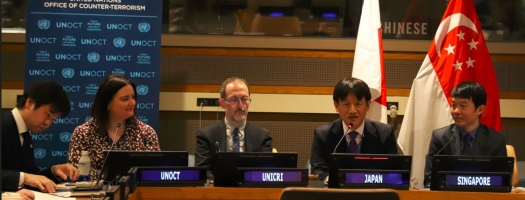On the margins of the United Nations Economic and Social Council (ECOSOC) Youth Forum 2025, the United Nations Interregional Crime and Justice Research Institute (UNICRI) and the United Nations Office of Counter-Terrorism (UNOCT) held a side event entitled, “Press Start: Understanding Harms in Online Gaming Spaces”. The side event was organized in partnership with the Permanent Mission of Japan and the Permanent Mission of Singapore to the United Nations.
With gaming being a central part of young people’s digital lives, the side event provided an opportunity to deepen understanding of online harms in video gaming and gaming-adjacent spaces. The event highlighted the need for safer, more secure, and supportive digital environments in alignment with Sustainable Development Goal 3: Ensure healthy lives and promote well-being for all at all ages.
For millions of young people, gaming is more than just a pastime - it is a force for good, a place to connect, compete, create, and find community. However, like any online space, video game platforms and gaming-adjacent environments can also be exploited for harmful activities. Violent extremists and terrorists exploit gamification, pop culture references, and cross-platform engagement to seamlessly infiltrate gaming communities, making detection and intervention increasingly difficult. The forms of harm are diverse, ranging from harassment, grooming, the spread of propaganda, and recruitment to terrorism.
Convening representatives from Member States, the United Nations, and civil society organisations, the event explored emerging trends in online harms within gaming spaces and their impact on youth mental health and well-being, while underscoring the collective responsibility of gaming companies, policymakers, and civil society to act. Speakers emphasized that fostering safer gaming environments, building digital resilience, and empowering youth through positive engagement must be a shared priority.
In opening the event, the Minister of the Political Section of the Permanent Mission of Japan to the United Nations, Mr. Iriya Takayuki, emphasized that “The problem is not the games themselves, but how we design our approaches towards those illicit acts. That is why an update is needed in the policy field. As a responsible actor that has driven the game industry to date, Japan is committed to finding ways to effectively address illegal activities in the gaming sphere, such as recruitment attempts, by such harmful actors.”
Deputy Chief Executive, National Youth Council of Singapore Mr. Tan Lin Teck shared that the Singapore Government’s approach to combatting online harms in virtual spaces has been three-fold: First, to implement regulations and measures to strengthen online safety, including through the Code of Practice for Online Safety, which put in place systems and processes to mitigate users’ exposure to harmful content; second, through public education to empower youth with digital skills; and third, by building partnerships with youth and social enterprises to teach families about online safety.
Speaking during the event, Christophe Monier, the United Nations Secretary-General’s Representative on the Board of Trustees of UNICRI, noted that UNICRI’s work in this space is guided by a simple principle: the safety and well-being of youth must be protected across all digital environments — whether on social media, messaging apps, or in games. This means examining how malicious actors exploit connectivity, anonymity, and interactivity, and developing responses grounded in research and informed by affected communities. Gaming platforms are simply the latest digital space where familiar risks are evolving in complex new ways.
In a recorded statement, Mauro Miedico, Director of the United Nations Counter-Terrorism Centre within UNOCT, also highlighted the importance of coordinated efforts, stating, “The challenge before us is to maximize the positive potential of gaming while minimizing its risks. This requires efforts between governments, the private sector, civil society, and the gaming community itself to develop whole-of-society preventive strategies and interventions. We must also recognize the critical role of young people as agents of positive change”.
The event featured a preview of the findings of a joint UNOCT-UNICRI study on the intersection of gaming and violent extremism in Africa, which is expected to be released in May 2025. The study aims to compare trends across the continent with those observed in other regions of the world, in the context of technology access, socio-political factors, and regulatory frameworks.
Closing the event, Kentaro Matsumura, Counter-Terrorism Expert, Permanent Mission of Japan, reemphasized Japan’s support of the forthcoming study on gaming and violent extremism in Africa, and its commitment to work with Member States and UN Agencies on the nexus between gaming and violent extremism through ongoing research and dialogue.
For more information:
Laurence Gerard, Head of Strategic Communications Unit, United Nations Office of Counter- Terrorism (UNOCT), gerardl@un.org
Marina Mazzini, United Nations Interregional Crime and Justice Research Institute (UNICRI), marina.mazzini@un.org
